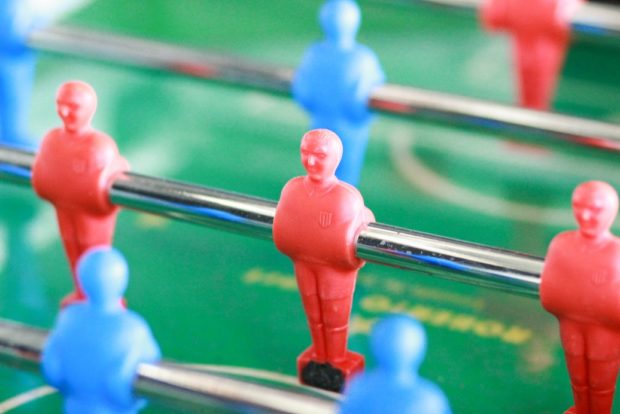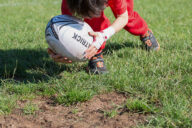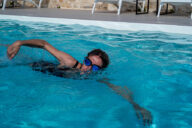My Introduction to Sport
Where do I start? My first introduction to sport was as a small child watching my mother play tennis. She was very competitive. I saw it in her reactions to a shot that put the ball into the net or when the ball landed outside the lines that defined the playing area. My mother also played field hockey and my father played rugby league. All my siblings played sport, as did many of my uncles, aunties and cousins on both sides of my family.
My grandfather played lawn bowls and, as my family shared the house of my mother’s parents, I would experience him coming home most Sundays always affected by alcohol, and sometimes with a gift for his performance on the greens or a tray of meat from the raffle.
At school we had swimming and athletic carnivals. I didn’t learn to swim until a little later, but I loved the athletics. It was a little different back then: as well as the running we had the three-legged race, where two people standing side by side would have their ankles tied together, meaning that they had one leg each free and the other two legs had to work in harmony with each other. We also had the sack race. We climbed into a potato sack and then had to jump our way to the finish line. Such fun! Even then I was very competitive and good at all the events in comparison to others. I was surrounded by sport.
At the age of seven I started playing rugby league. I had two years in the Under 8’s, winning the competition the second year with me scoring all the tries. The attention that I received from all these experiences when young reinforced my competitiveness and showed me that sport was the way to satisfy my need for recognition, allowing me to feel a little more comfortable with myself, albeit only temporarily.
The seeds that were planted watching my mother play tennis were now starting to shoot.
At 11 or 12 I started playing cricket. I tried tennis but was not as good as I was at the other sports so “I did not like tennis.” The cricket and football continued at school and for the relevant clubs, and of course every year there was a school athletics carnival. Swimming was another sport that “I did not like.” Success in the sporting area as a child and during my early teenage years gave me what I was looking for, being able to feel better about myself and have people like me. But that need was never fully satisfied.
Pushing to be ‘Better’ at Sport & Becoming a Brat
It was at the age of 11 that I started to learn that I could punish my body, which allowed me to be ‘better’ at sport. I needed to lose some weight to make the 5 stone 7 pounds (or 35kg) school representative football side, so every day I would run 3 miles or 4.8 km. I lost the weight. I liked doing that. My introduction to fitness was another distraction to continue my journey away from whom I truly was, progressively changing me from that tender, gentle and loving boy who came into this world six decades ago.
At school I was never top of the class as a student, the exception being in PE at high school. Otherwise, in classes of 30 plus students, I always finished in the middle, which started to feed a line of thought that I was ‘Mr Just Above Average.’ I knew that I was good at sport compared to my schoolmates, but not really good. Later on, this would feed into every part of my life.
Through my early teens nothing really changed. More success on the sporting field, my parents willingly paying for numerous trips all over the state of NSW. I was turning into a spoiled brat. I was always demanding more from my parents: I had perfectly good shoes but desperately needing the much more fashionable Nike or Adidas. I remember having a big dummy spit because they would not buy me those shoes. I always needed the best football or cricket equipment. I showed no appreciation for what I received; in fact, I expected nothing less. My parents got what they wanted but I was making them pay for it.
I started playing first grade cricket at the age of 16 and mixing with older men was a whole new experience. I had to become tougher than I already was, both physically and mentally. I was fortunate enough, again, to be successful and allowed myself to continue feeling good about myself.
Three years later I was playing first grade rugby league in a high-quality competition. Physically and mentally this demanded more of me. I had to train harder and there was more competition for a spot in the top team. This did not go well with my nervousness and anxiety. On game day I was not a nice person to be around. I would spend most of the morning in a room listening to AC/DC and other rock bands of the time. The purpose? To rev me up, make me feel more aggressive which I needed to be. Aggression was not natural to me so I had to call that energy in to survive in the coliseum, something I needed to do to feel better about myself and have people like me. The truth is they liked me for what I did more than who I was.
Travelling to the game I would be feeling nauseous from the nerves and in the minutes just prior to the game, dry retching or vomiting. This was all a part of my preparation. In fact, if I did not start dry retching I would start to question my preparation for the game – self-doubt big time. I had been successful in reaching this level with only a couple of levels to go: every child who plays sport has the dream of representing their country. I was no different.
Selling out at the Expense of Tenderness
A select few reach that level and they do that because they are willing to sacrifice what tenderness remains from whom they were as very young children. Yes, there is the physical aspect and talent side to it, but some are more willing to sell themselves in exchange for further developing those talents and physical requirements.
I knew by this time that, as mentioned above, I was just better than average. I would never reach the top because I never thought that I would. In saying that, I never played that way – I always pushed myself to my physical limits, whether at training or in a game. I still believed that punishing myself physically was a way of getting the results that allowed me to feel good about myself. People would like me for what I did, for what I was able to achieve.
You might have picked up a thread through this article that I did not like myself very much – and you would be right. I was a very nervous and anxious man, and this carried through to how I played sport. I was not a risk taker. I was very conservative in how I played, not wanting to make a mistake. This was always going to cap what I would achieve. There is an old saying – play to win. I can look back now and say that in most cases I played to not lose. This was my everyday life being played out in a sporting context… or was it the other way around?
Playing sport comes with the potential for injuries, and I have had my fair share, although I always regarded myself as doing pretty well as far as injury was concerned. I can look back now and recall the torn ligaments or tendons in the ankle and knees, the torn hamstring, groin or displaced hip, broken bones in my back, broken or dislocated thumbs or fingers, dislocated collar bones, head concussions or the many stitches inserted into my head and face to close up lacerations. If I was doing okay, how were the others doing?
Our willingness to play with injuries and put up with the pain is a measure of one’s toughness. Men, and now women, are identified by their ability to ignore what their bodies are telling them and sometimes play with serious injuries. Did you know that women play all of the football codes these days, including rugby league and rugby union, two very tough contact sports? Is this really the equality that women are seeking?
Sport, Competition & Drinking
Sport is about winners and losers. For every winner that gets to celebrate, there are many who suffer the hurts of being not good enough, beating themselves up because they should have done this or not done something else. Even those that win need more – an athlete that wins but wanted a faster time, for example.
Why would we willingly and deliberately do this to ourselves and other human beings who are no different from us? Sport is competition, no different from two countries fighting over land, water or commodities that lie beneath that land. In that sporting competition I hated the people I was playing against. They were my enemy. They were the ones trying to stop me from being recognised. It was war, but with who? Who was my real enemy?
To complicate things even further I started drinking at the age of 17 and the sports that I chose to play had very ingrained cultures around drinking alcohol. I was playing with much older, more experienced men, and not just on the sporting field. We pushed ourselves to the limit physically and then rewarded ourselves by going to the pub or club for a schooner or ten. I usually lost count before that stage. Drinking a schooner was the standard glass size – I think from memory 15 fluid ounces, while a middy, the next size down and being 10 fluid ounces, was generally for those who weren’t real men. I was not all that good at drinking.
There was always competition in the drinking. Some men claimed their authority by drinking faster than others or by how many beers they could drink. You had to try and keep up – you were defending yourself as a man. Some claimed a short-lived notoriety by sculling (drinking the whole glass in one go) their schooner of beer, or what was called a half-yard glass.
The drinking is designed to further entrap us, and in my case, it allowed me to escape any responsibility, any issues or problems that I may have had. They were always still there the next day, trapped in a cycle of train, drink, play, drink. The culture around alcohol in sporting clubs at that time was poisonous. I am quite fortunate to still be here in this life having narrowly avoided a serious car accident on more than one occasion when driving after drinking. I was still living at home with my parents. It must have been horrible for them knowing that I was out drinking and then driving home.
This pattern of behaviour remained the same whatever the sport. A new sport came along for me, touch football, not as demanding on the body as rugby league, but had all the same trimmings as the others. I could feel better about myself because I was good at playing the game, then drink to forget the fact that the real me was hiding behind this magical show. Everything was short-lived and just a temporary fix for the problem that I had. It was never going to provide me the opportunity that I was searching for: to return to the qualities that I had when I was born and to leave behind all the ideals and beliefs that had been imposed upon me by the world and reinforced by sport.
Life without Competition
My very competitive mother is in her 80s and stills hits a small, mostly white ball around a golf course. She is very hard on herself if she plays a bad shot and still loves to get a lower score than others. On a recent visit to see them we had a discussion about the changes that I have made to how I live, and sport came up – naturally, as that was how my parents identified with me, as a sportsman. Sport is still a big part of their lives. They will spend hours watching golf, tennis, rugby league, cricket. Dad loves the trots on the T.V.
I was able to explain to them what I now know was my real purpose for playing sport – to receive recognition and be liked by people. I was looking for other people to make me feel better about myself, to hide the pain that I felt from withdrawing from the qualities that came with me when I was born. My mother’s response pointed out to me something that I already knew all those years ago but conveniently ignored, and that is that people already liked me – my real problem was not liking myself. My father sat quietly to one side, understanding the conversation but not ready to accept that sport is used as a tool to pull us further away from our Soul and God.
This was no different from myself when I came across the teachings of the Ageless Wisdom presented by Serge Benhayon. For several months I stoutly defended sport and competition and today, six years later, my ears will still prick up when the word ‘sport’ is used. Competition? Did I mention that competition is also present in our relationships at home as well as at work? For some, it dominates their life. I know it still exists in me, albeit at very low levels and it affects my relationships with myself and other people.
Sport – competition. Life – competition. Perhaps there is a way of living that has no competition…
What if we could live a life where everyone was equal, where we would need nothing from others because it was already within us. What would our world look like if this was the case?
By Anonymous
Further Reading:
My Turnaround from Competitive Running to Connection with Me
The Body and My Relationship with it
My Reflection on Competition and Sport





